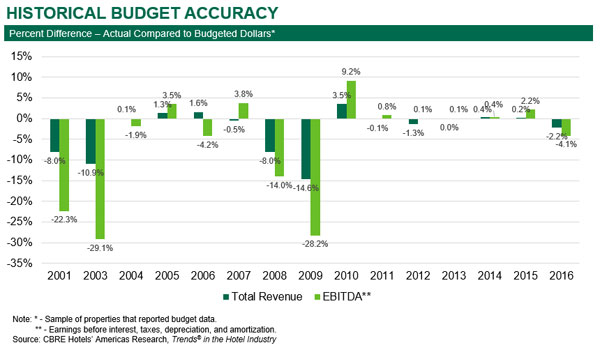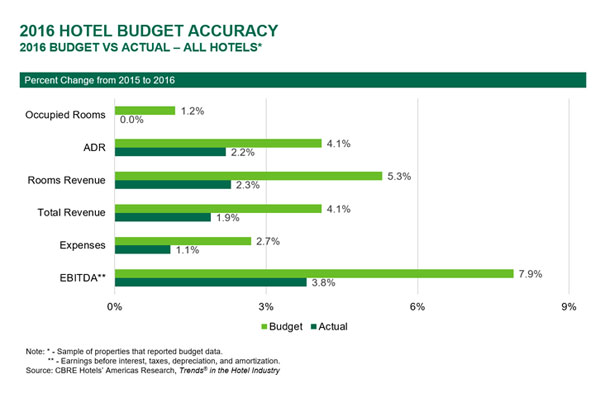✕

Column: industry Tag: revenue and profit growth,US hotels Published: 2017-11-08 11:16 Source: Author:
REPORT FROM THE U.S.—From 2010 through 2015, U.S. hotels enjoyed above long-run average revenue and profit growth.
Over the six-year period, total operating revenue increased at a compound annual growth rate of 5.8%, while gross operating profits grew at a CAGR of 8.9%.Therefore, when U.S. hoteliers sat down in the fall of 2015 to prepare their budgets for 2016, it is no surprise they believed the strong upward momentum in revenue and profit growth would continue.
Unfortunately, 2016 was a disappointment. Revenue and profits increased, but not at the levels hoteliers budgeted. Occupancy and average-daily-rate growth fell short of expectations, which led to a revenue shortfall. While the lower occupancy levels resulted in less expense growth, it was not enough to offset the limited revenue growth. Therefore, the goals for increases in profits were not met.
As general managers, controllers and directors of sales prepare their budgets and marketing plans for 2018, we present the results of our most recent look at the budgeting accuracy of U.S. hotel operators. From CBRE Hotel’s Americas Research’s “Trends in the Hotel Industry” database, we identified 629 operating statements that contained both actual and budgeted data for 2016. Using these statements, we compared the revenues and expenses projected for 2016 with what was actually earned and spent during the year.
Budget accuracy falls
Since 2001, CBRE Hotels’ Americas Research has assessed the accuracy of hotel budgets. Over the past 16 years, one trend has become predictable. During times of industry prosperity, hotel budgets are more accurate than during industry downturns.

During the historical years of growth, hotels beat their budgeted revenue goals by an average of just 0.5%, while profit goals were exceeded by 1.4%. For the purpose of this analysis, profits are defined as earnings before interest, taxes, depreciation and amortization.
Given this historical trend, along with forecasts for a continued healthy environment for travel, 2016 budgets had the potential to be very accurate. Unfortunately, accuracy slipped during the year. The hoteliers in our sample forecast a 4.1% increase in total operating revenue for 2016. Unfortunately, revenues grew by just 1.9% during the year, a 2.2% overestimate.
On the bottom line, hoteliers projected a strong 7.9% gain in EBITDA. Ultimately, the revenue deficit was too much to make up. EBITDA at the properties in our sample increased by a modest 3.8%, or a budget deficiency of 4.1%.
Expense gap less than revenue shortfall
The shortage in revenue was the result of budget gaps in both occupancy and ADR. For 2016, the hotel managers in our sample forecast a 1.2% occupancy gain along with a 4.1% increase in ADR. At the end of the year, however, occupancy for these properties remained flat, while ADRs grew only 2.2%.

The net result was a full three-point budget deficit in rooms revenue, which contributed significantly to the 2.2% shortfall in total revenue. Given the magnitude of the gap in rooms revenue, it can be assumed that the budgeted changes in other hotel revenues were more accurate.
By accommodating fewer rooms than budgeted, the hotels in our sample did incur less expense growth than planned. During 2016, expenses at the properties in the study sample increased by 1.1%. This is 1.6% less than the budgeted expense growth rate of 2.7%.
What to budget for 2018
According to the September 2017 edition of “Hotel Horizons,” CBRE Hotels’ Americas Research is projecting that a 2.4% increase in RevPAR will lead to a 2.3% gain in total hotel revenues during 2018. Concurrently, operating expenses are forecast to rise by 2.6%, leading to an improvement in profits of roughly 1.8%.
On the one hand, the positive market forecast indicates the odds are favorable for U.S. hotels to achieve their budgeted targets in 2018. However, given the modest gains expected for both revenues and profits, the softness of the 2018 forecast could contribute to budget deficits during the year. Pressure from owners makes it difficult for hotel managers to prepare conservative budgets. Let’s just hope any inflated expectations for revenues and profits that might be contained in the 2018 budgets are not too exaggerated.
Previous:Choice execs: Hurricanes could affect RevPAR numbers
Next:Execs say guest experience still drives decision-making
Hot key words
Hot Products
Popular Vendors